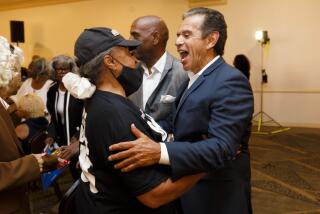Will gridlock trap 30/10?
The implications of the midterm Republican wave that may add as many as 65 new GOP members to the House have yet to be sorted out, but the fate of Mayor Antonio Villaraigosa’s 30/10 transit plan is one that ought to be of vital concern not only to this city but to the country as a whole.
The mayor’s proposal, which is supported by nearly every other elected official in Los Angeles County as well as the U.S. Conference of Mayors and the Obama administration, builds on Measure R, which was approved by two-thirds of the voters and assigns three decades of revenues from an incremental sales tax increase to fund a specified list of projects that would dramatically expand public transit. Rather than wait 30 years, Villaraigosa has proposed that Washington provide bridge financing secured by the guaranteed tax revenues so that all the projects can be completed in just 10 years, thereby accelerating the environmental and transit benefits, significantly reducing the total cost of the projects and creating more than 160,000 desperately needed construction jobs.
Sen. Barbara Boxer’s victory over Carly Fiorina, and the Democrats’ retention of their majority in that chamber, mean that 30/10’s leading congressional advocate will continue to chair the vital Environment and Public Works Committee. In the House, however, 17-term congressman James L. Oberstar — a 30/10 backer — lost his seat representing Minnesota’s Iron Range. His chairmanship of the equally crucial House Transportation and Infrastructure Committee now will pass to Florida Republican John L. Mica. Oregon Rep. Peter DeFazio — another vocal 30/10 ally — will remain the committee’s ranking minority member, but will lose his chairmanship of the surface transportation subcommittee. (Transportation Secretary Ray LaHood, one of President Obama’s Republican Cabinet secretaries, may resign in the wake of the GOP resurgence, and reports say Oberstar may be a candidate for his job.)
It’s clear that 30/10’s road to realization has become a lot rougher. Though he holds a nonpartisan office, Villaraigosa is an unapologetically partisan Democrat with deep roots in organized labor, which is the demon of choice to many congressional Republicans. When the presumptive leaders of the GOP’s House majority announced their “Pledge to America,” Villaraigosa gave it the back of his hand. “It’s a plan,” he said, “that does absolutely nothing to create jobs.”
Even so, one knowledgeable person who has worked on transportation issues under both Republican and Democratic administrations — and who asked not to be identified — said there are reasons 30/10 may be attractive to the new Republican leadership. Though the new majority is opposed to earmarks, its leaders also want to lift the economy and create jobs, which usually means more transportation spending. At the same time, the House leadership is unalterably opposed to new federal gas taxes. That creates an opportunity for 30/10, which is why Los Angeles’ lobbyists now are working to reposition the plan as a national program, reminding lawmakers on both sides of the aisle that both Obama and LaHood have called it “a template for the nation.”
Rather than looking for legislation that would create a federal infrastructure bank to finance 30/10-style projects, Deputy Mayor Jaime de la Vega says that Los Angeles now is looking for Republican co-sponsors on a bill to allow the sale of private-sector bonds. Under that approach, Measure R revenues would repay the principal while Washington provided bridge financing in the form of interest rate subsidies. The emphasis on private financing is intended to soften Republican objections, and the proposal mirrors the federal approach to paying for school construction.
De la Vega said that when he and Villaraigosa transportation advisor Richard Katz recently were in Washington, they met with Bakersfield Republican Kevin McCarthy, the presumptive GOP whip, who was “intrigued by and sympathetic to” 30/10. Mica, meanwhile, also expressed great interest in the concept of new public-private partnerships. In fact, in an interview with Bloomberg News this week, Mica called himself “a strong advocate” of such innovations and said they hold the potential for “explosive investment” in transportation infrastructure. “People are hungry for work,” he said.
That’s nowhere truer than in Los Angeles County, where unemployment among heavy-construction workers is running at more than 40%. None of this will matter, though, if bitter partisanship consumes the next Congress and spreads gridlock from Capitol Hill to Los Angeles.
More to Read
Get the L.A. Times Politics newsletter
Deeply reported insights into legislation, politics and policy from Sacramento, Washington and beyond. In your inbox three times per week.
You may occasionally receive promotional content from the Los Angeles Times.









